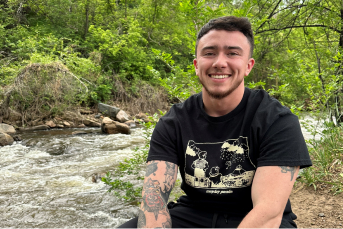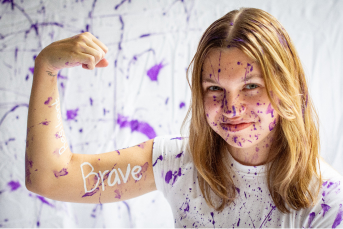Nikki spends her free time listening to and playing music, she plays bass & drums and sings. Otherwise she enjoys reading, going on hikes and motorsports!
How did your epilepsy journey begin?
My epilepsy is mixed, my severe seizures are usually convulsive where I’m not aware of what’s going on but my mild/less severe seizures can be non-convulsive and I am usually aware of them.
The first time I experienced seizures or epilepsy-related issues was after a serious traumatic brain injury (TBI), from an incident during one of my military deployments. With medication and regular follow-ups, my seizures were mostly under control. However, things went south again after receiving another head trauma in a car wreck. Ever since the crash, I started to learn more about my condition, and I also tried to help others with the same experiences as well. Since this condition has an affect on mental health as well, I have been an active advocate in the mental health aspect within the community.
Read more: Epilepsy and depression: let’s talk about it
.webp)
Experience with her neurologist
My experience with my neurologist following my deployment TBI and the injury I sustained in a motorsports accident consisted of regular follow-up appointments. I had regular MRI and/or CT screenings when needed. I can say that my neurologist was open and helpful when I had questions.
After the diagnosis, I felt like “my life will never be the same” at first, because I thought that I was not going to be able to enjoy a lot of the things that I enjoyed prior to that such as my motorsports! However, thankfully, that has not been the case. With regular checks and medication, I can do pretty much everything I would like to. I knew a bit about epilepsy prior to my diagnosis as a few of my colleagues also experienced TBI-related epilepsy after similar incidents.
Military experience
I am enlisted and not a Commissioned Officer but I have been in and out of service since I was 18 years old. That makes it nearly 18 years, as I am 36 years old now. After my TBI related to my duty, the military made sure I got the proper treatment needed, for which I am thankful for. However, in terms of “support” I didn’t really see anything except for my colleagues in my unit.
Veterans can often also experience PTSD, learn more: the link between PTSD and epilepsy.
What support do you have?
My husband and my niece are so supportive, they make sure I don’t forget to take my medication, they have been learning about my condition and what they should do in an emergency situation. They have also been very attentive to my doctor appointments and to the sudden changes in my actions that might indicate the onset of an upcoming seizure. I am lucky to have them by my side through it all.
Find out more: How to find epilepsy support groups
The experience with Epsy
I have recently started using the Epsy App, I find it very user-friendly and helpful. It is helping me a lot with medication reminders, and being able to keep track of my symptoms is great too. I will be able to explain things to my doctor much better at my next appointment thanks to Epsy.
Message to other people living with epilepsy
My message to others living with epilepsy is that; although this condition can make life difficult at times, it’s not a life-sentence. If you stick to your medications, follow-your appointments and keep track of your experiences, epilepsy can’t hold you back from doing anything that you enjoy… so stay positive!
How can you share your epilepsy story?
If you would like to share your epilepsy story with the Epsy community, you can contact our team at contact@epsyhealth.com and our team will set this up for you.

















